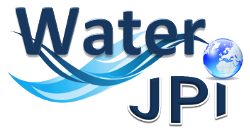Newsletter December 2020
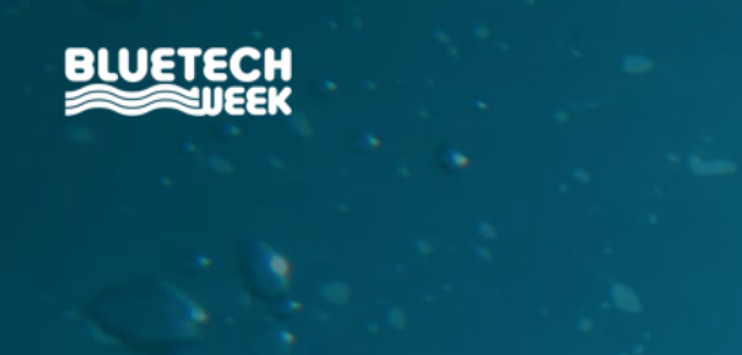
Water JPI on the Bluetech week
Blue Tech Week BTW2020 is the annual event where hundreds of international participants gather in San Diego to highlight collaboration and innovation. Organized by TMA Blue Tech, each year, Blue Tech Week brings together companies, institutions, and ...
Blue Tech Week BTW2020 is the annual event where hundreds of international participants gather in San Diego to highlight collaboration and innovation. Organized by TMA Blue Tech, each year, Blue Tech Week brings together companies, institutions, and policymakers.
For its 12th annual Blue tech week, the overall theme was “AquaOptimism™, BlueTech & SDGs”. The UN 2030 Agenda for Sustainable Development Goals and its plan of action for people, planet and prosperity guided this 12th Blue Tech Week. TMA BlueTech also embraces the idea of AquaOptimism™ - to think positively about the future of our water systems and provide forward thinking solutions to the current problems.
The different panels focused on innovation, collaboration, globalization and sustainability to bring together academia, government, and industry. The event showcased innovative companies from around the world bringing Ocean and Water solutions to a variety of markets.
This year, it was held virtually. The Water JPI participated to two panels, one on the Starfish Mission of Horizon Europe, and the other one about Funding Opportunities for Water Tech.
For the Funding opportunities, the 230 people who attended virtually the event had the opportunity to ask questions about funding innovation, public-private partnerships, technology transfer and capacity building. Water JPI stressed that multidisciplinary approaches are important to build the future, and that training people to grasp these approaches is essential for our future and AquaOptimism™.
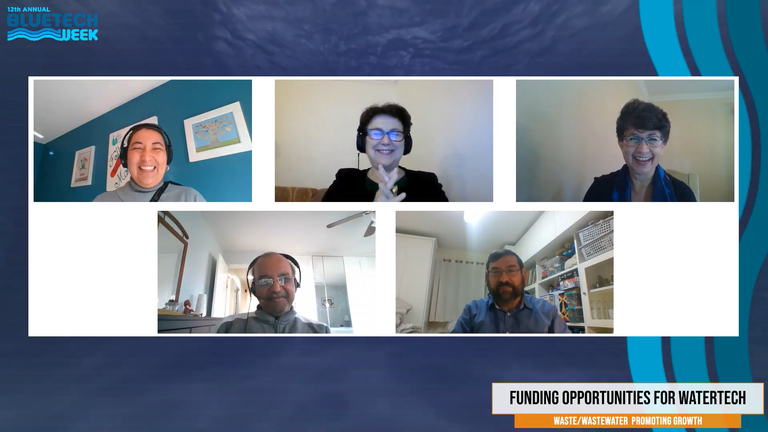
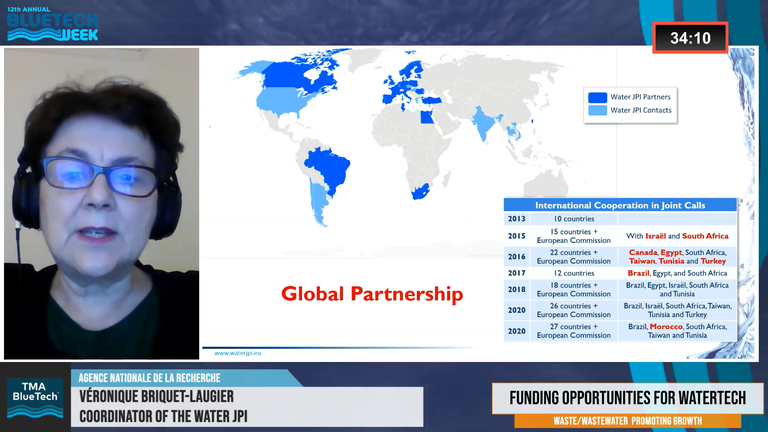
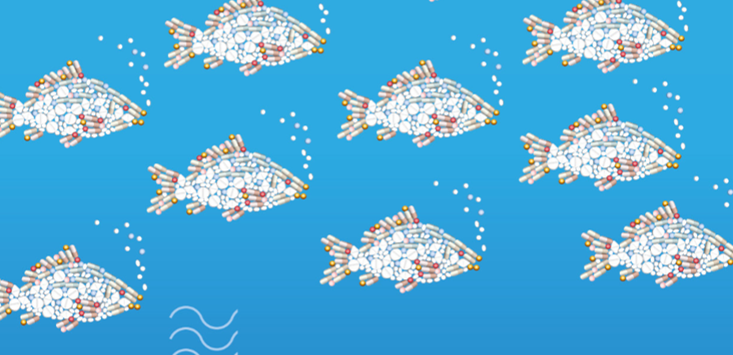
Pharmaceuticals in the environment: AquaticPollutants expected to contribute to the EU Strategic Approach to reduce their adverse effects
The European Commission has published on 2nd December 2020 an overview of the progress made in implementing the actions of the Strategic Approach to Pharmaceuticals in the Environment. This strategic approach presented last year aims to counteract ...
The European Commission has published on 2nd December 2020 an overview of the progress made in implementing the actions of the Strategic Approach to Pharmaceuticals in the Environment. This strategic approach presented last year aims to counteract the negative effects of pharmaceuticals on the environment, covering their whole lifecycle from design and production through use to disposal. Findings show that overall, good progress has been made so far, and some actions presented in the strategy are already well advanced or have even been completed.
The remaining actions are to be achieved through several European Green Deal initiatives, as well as the Pharmaceutical Strategy adopted on 2nd December 2020. These Green Deal initiatives include actions that will play a role in reducing the environmental footprint of pharmaceuticals, especially the Chemicals Strategy for Sustainability , the From Farm to Fork target on reducing the EU sale of antimicrobials for farmed animals and in aquaculture, and the forthcoming Zero Pollution Action Plan . Other initiatives, including the 8th Environment Action Programme to 2030, the Circular Economy Action Plan for a cleaner and more competitive Europe and the EU Biodiversity Strategy for 2030, set a framework for generating an overall shift to a production and consumption of resources, materials and chemicals, which is safe and sustainable by design and creates the lowest possible impact on the environment, including pollutants of emerging concern.
The overview shows that implementation of some actions is already quite advanced:
- The revised Surface Water Watch List, under the Water Framework Directive, was adopted in August 2020 and included additional pharmaceuticals. This watch list functions as an early warning system for pollutants in surface waters.
- Legal acts are currently being drafted under the Regulation on veterinary medicinal products, which aim to promote a more prudent use of antimicrobials in animals, and implement a wide range of concrete measures to fight antimicrobial resistance.
- New guidelines on hazardous household waste have been developed. Pharmaceuticals are also being considered in the impact assessment for the potential revision of the Urban Waste Water Treatment Directive.
- The last Land Use and Coverage Area frame Survey (LUCAS soil survey) sampled pharmaceutical concentration and antimicrobial genes in soil, with results expected in 2022.
- The EU has started work with Member States’ health ministries, for instance to ensure health professionals consider environmental impacts of medication.
- In the research arena, the ongoing Horizon 2020 programme is co-funding with Member States solution-oriented research, such as AquaticPollutants Call which is expected to fill the knowledge gaps on the contaminants of emerging concern, pathogens and antimicrobial resistance development in aquatic ecosystems.
To Read more, please click here.
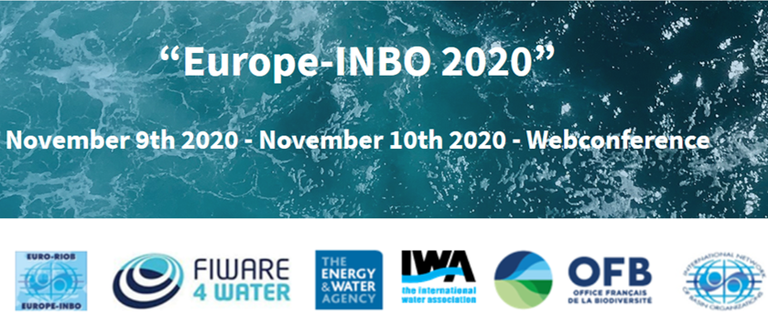
18th "Europe-INBO 2020" International Conference for the Implementation of the European Water Directives
The Group of European Basin Organizations for the Implementation of the Water Framework Directive (EURO-INBO) organized on the 9th and 10th November its 18th International Conference, online due to the health situation. 306 participants from 47 ...
The Group of European Basin Organizations for the Implementation of the Water Framework Directive (EURO-INBO) organized on the 9th and 10th November its 18th International Conference, online due to the health situation. 306 participants from 47 countries attended the event.
The programme included an interactive workshop dedicated to the European partnership "Water4all – Water Security for the planet”. Mr. Panagiotis Balabanis (European Commission – DG Research & Innovation) first introduced Horizon Europe and the water-related topics in the draft work programme for 2021-2022. Mr. Olivier Bouc (ANR) then described the content of the Water4All initiative and the possibilities for River Basin Organizations to get involved. Mr. Miguel Polo (Water Commissioner from the Jucar Hydrographic Confederation in Spain) brought the point of view of an end-user of science advances. This confederation is a pioneer in remote sensing use for controlling water abstraction.
Mr. Polo highlighted also a few topics of major interest from his perspective:
- The identification of hydrographic channels;
- Floods and drought predictions with real-time flow rates update;
- Bioremediation for pollution;
He stressed the need to have local solutions to match very localized issues.
The Water4All partnership may be appropriate to tackle these topics by bringing together R&I providers with practitioners and private companies. The Jucar may for instance be one of the “living labs” considered in Water4All.
The discussion brought up questions notably around the capitalization of good practices and barriers to their practical implementation.
In closing the session, Mr. Eric Tardieu, General Secretary of the International Network of Basin Organizations (INBO), announced he would sign the support of INBO to the Water4All initiative strengthening the integration of the water community.
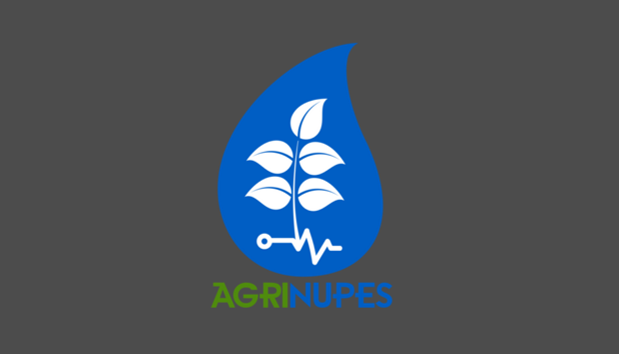
Final conference of AGRINUPES projet
The AGRINUPES project « Integrated monitoring and control of water, nutrients and plant protection products towards a sustainable agricultural sector », held its final webinar on the 4th December. Funded within the frame of the Water JPI Joint Call ...
The AGRINUPES project « Integrated monitoring and control of water, nutrients and plant protection products towards a sustainable agricultural sector », held its final webinar on the 4th December. Funded within the frame of the Water JPI Joint Call 2016 of the ERA-NET Cofund WaterWorks2015, the AGRINUPES project aimed at the development of an effective integrated and sustainable monitoring and control system for optimal water and nutrient supply and reuse. It has brought partners from Portugal, Spain, Sweden, The Netherlands and Turkey.
AGRINUPES’ consortium members presented the main results of the project, possible uses and applications. The webinar also counted on the participation of 4 other projects funded in the Water JPI Joint Call 2016. Esther Diez Cebollero was invited as Water JPI representative to make a presentation of the initiative as well as the upcoming Water4All Partnership, and to moderate the round table session around « The future of water use ».
The webinar showcased innovative solutions for sustainable water management in agriculture, greenhouse management, and water reuse efficiency and resilience. Discussions during the round table highlighted that technological innovations have allowed the treatment and reuse of water, the reduction of carbon emissions and the development of alternative (« unconventional ») sources of water. These technological solutions need to be though accompanied by new economic and legal frameworks as well as a change in users’ paradigm on their perception of water in non-stressed water areas. The role of social sciences and humanities was thus stressed by participants.
The round table also showed the strong willingness of participants to expand their activities internationally and to cooperate with research groups outside Europe (in particular, with northern African countries).
Webinar participants are eagered to pursuing their collaboration after the end of the projects and to continue contributing to the Water JPI through their involvement in different activities around water and agriculture (e.g. launch of groups of experts on this topic, write-up of strategic papers).
More information on the AGRINUPES project is available here.
The programme of the webinar is available, click here to download.
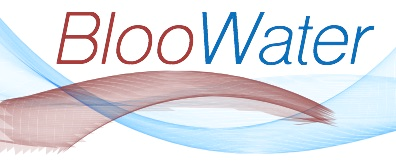
Bloowater Project: Supporting tools for the integrated management of drinking water reservoirs contaminated by Cyanobacteria and cyanotoxins
Cyanobacteria, also known as blue-green algae, can rapidly proliferate forming visible blooms under favorable environmental conditions, and release toxic secondary metabolites (cyanotoxins) into the water during their senescence and death.
...
Cyanobacteria, also known as blue-green algae, can rapidly proliferate forming visible blooms under favorable environmental conditions, and release toxic secondary metabolites (cyanotoxins) into the water during their senescence and death.
Periodic blooms of cyanobacteria are common in a wide range of water bodies, in Europe they include fresh waters (natural lakes, rivers, ponds, artificial reservoirs and canals) and brackish waters (the Baltic Sea, estuaries, and lagoons).
Exceptional and prolonged cyanobacterial blooms are increasingly detected in lakes and reservoirs in Europe and throughout the world due to anthropogenic emissions of nutrients and climate change. Therefore, the excessive presence of cyanotoxins forming the so called Harmful Algal Blooms (HABs) in freshwater reservoirs can pose serious risks to human health and activities, aquatic wildlife, domestic animals and also livestock.
For example, in humans cyanotoxins can cause skin irritations after contact and illness if swallowed such as headache, gastroenteritis, and even attack the liver and the brain.
Cyanobacteria occur in waterbodies in all 29 European countries, for example in Italy 12 regions out of 20 are affected by this phenomenon (Figure 1).
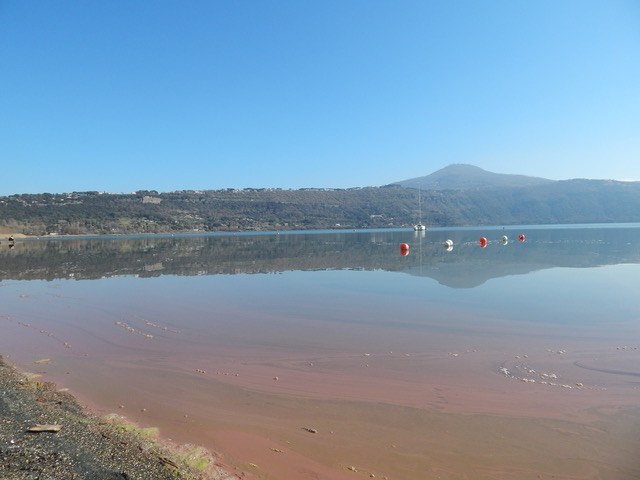
Lake Albano during an algal bloom in February 2020
To preserve drinking water and human well-being, effective risk assessment and management strategies need to be planned particularly considering all possible routes of exposure for human beings.
Researchers from Italy (ENEA, UNIVPM), Norway (NIVA) and Sweden (UU) are working together at the WJPI BLOOWATER project, in the effort to develop a low-cost methodological approach based on the integration of monitoring techniques and treatment of drinking water affected by toxic blooms caused by Planktothrix rubescens.
BLOOWATER will integrate innovative methodologies into a multisensor platform to improve water quality through the development of effective low-cost and functional measures into prompt and opportune intervention procedures for efficient and sustainable management of the water resources.
The methodology will be implemented and tested in four lakes, Lakes Erken and Mälaren in Sweden and lakes Albano and Castreccioni-Cingoli in Italy, that are the pilot areas where to carry out the data sampling and test cyanotoxins monitoring and forecasting models under real conditions.
ENEA and UPPSALA University are working to a monitoring system development.
A satellite/drone integrated monitoring system has been defined to combine water sampling and remote data in order to implement and test an early warning system.
The acquisition of remote sensing data will be done from Sentinel-2 satellites.
Sentinel 2 will provide multispectral data for monitoring water surface condition variability, with a high revisit time (with 2 satellites under cloud-free conditions it results in 2-3 days at mid-latitudes). The sensor mounted on the drone is a triple-band multispectral filter camera, the Survey3, Mapir Inc. (figure 2)
The water samples are processed in the laboratory for the analysis of nutrients (nitrogen compounds and phosphates), study of the phytoplankton population and measurement of the total chlorophyll concentration by Phyto-PAM-Phytoplankton & Photosynthesis Analyzer (Heinz Walz GmbH, Effeltrich, Germany); as well as filtration and extraction of photosynthetic pigments and spectrophotometer analysis.
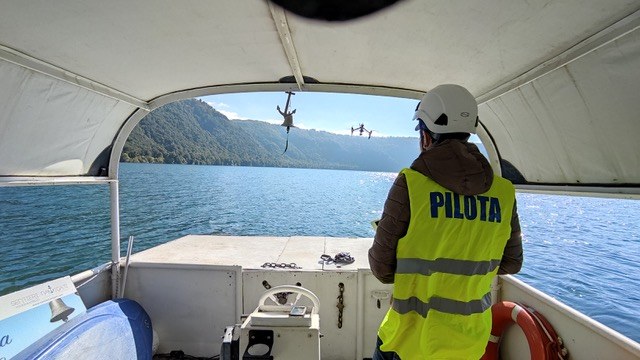
Drone flying on lake Albano in November 2020
As a part of the TREATMENT PROCESS COMPARISON activities, UNIVPM and NIVA are conducting tests to assess the appropriateness of using membrane treatment to remove cyanobacteria and their cyanotoxins from contaminated raw water sources instead of conventional treatments such as coagulation, flocculation and filtration that cause cells breaking and cyanotoxins release. Coagulation and flocculation, moreover, require the use of chemicals such as Aluminum sulphate.
NIVA is assessing factors that are believed to determine the removal efficiency and process stability of nanofiltration (NF), a much-applied treatment system (i.e. reference technology) when producing drinking water. Due to the different characteristics and properties of the many variants of cyanobacteria and cyanotoxins, the influence of factors such as pH, presence of natural organic matter (NOM) in the water and in/on the membrane as well as membrane characteristics (pore size and hydrophobicity/hydrophilicity) will be studied using selected cyanobacteria and cyanotoxins. NIVA also assess how the cross-membrane flow rate and the membrane operating pressure may influence the release of intracellular cyanotoxins during treatment.
In parallel to the NF tests, UNIVPM continues the development and testing of the polymer enhanced ultrafiltration (PEUF) system in bench scale.
In the recent years, the complexation-ultrafiltration technique has been shown to be a promising technique for removal of pollutants from water. In particular, the polymer enhanced ultra filtration (PEUF) using natural polymers such as Chitosan can be a novel alternative to treat waters polluted by cyanobacteria reducing both, the equipment and the treatment costs.
In this research, NIVA will contribute with biofouling tests using the long channel membrane test cell (LCMTC) system (Figure 1) specifically developed for such studies. They will, among other factors, assess how the pre-coagulation step influences the fouling rate and the removal efficiencies of selected cyanobacteria and cyanotoxins.
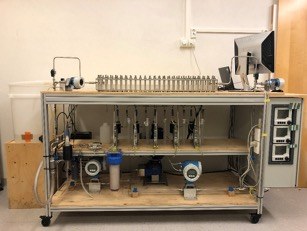
The long channel membrane test cell (LCMTC) system used to study biofouling of membranes. The membrane is 1 m long and has 5 sampling points.
ENEA, Italian National Agency for New Technologies, Energy and Sustainable Economic Development (Italy)
NIVA, Norwegian Institute for Water Research (Norway)
UNIVPM, Polytechnic University of Marche, (Italy)
UU , Uppsala University (Sweden)
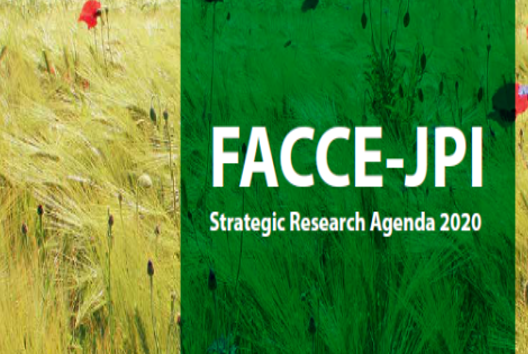
A new Strategic Research Agenda for FACCE-JPI
The Joint Programming Initiative on Agriculture, Food Security and Climate Change (FACCE-JPI) celebrates its ten year anniversary on the 26th and 27th of November by engaging in a high-level science-policy discussion. During this event, the JPI will ...
The Joint Programming Initiative on Agriculture, Food Security and Climate Change (FACCE-JPI) celebrates its ten year anniversary on the 26th and 27th of November by engaging in a high-level science-policy discussion. During this event, the JPI will also present its new Strategic Research Agenda, which is an update from the 2016 SRA and takes into account its past work and achievements and input from the members of FACCE-JPI as represented in the Governing Board. Member States’ national priorities that need to be highlighted were specified and integrated in the text, along with the JPI’s past and ongoing work with other European and international initiatives. It also takes into account the context of Horizon Europe with its new mission areas and partnerships. As before, this SRA will be implemented through successive Implementation Plans.
More information is available at the FACCE-JPI website.

Open Research Europe-The European Commission open access publishing platform
The European Commission is preparing the launch of Open Research Europe, the European Commission scientific publishing service, which will provide Horizon 2020 and Horizon Europe beneficiaries with a venue to publish their results in full compliance ...
The European Commission is preparing the launch of Open Research Europe, the European Commission scientific publishing service, which will provide Horizon 2020 and Horizon Europe beneficiaries with a venue to publish their results in full compliance with open access policies. Open Research Europe will provide all Horizon 2020 and Horizon Europe beneficiaries and their researchers with an easy, high quality peer-reviewed venue to publish their results in open access, at no cost to them. The formal launch of the platform will take place in early 2021.
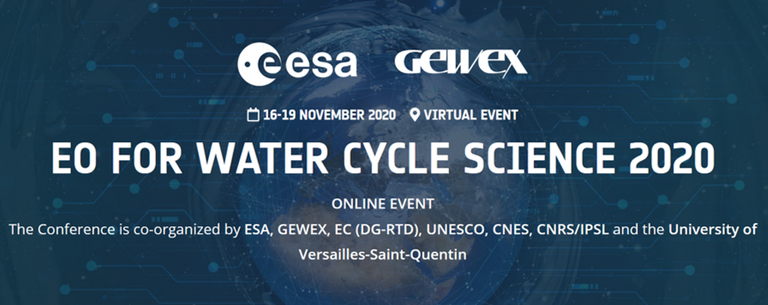
EO for Water Cycle Science 2020
ESA and GEWEX organized from the 16th to 19th November 2020 a virtual event “EO for Water Cycle Science 2020”. This Conference aimed at reviewing the latest advances in the use of Earth Observation (EO) technology for scientific questions related to ...
ESA and GEWEX organized from the 16th to 19th November 2020 a virtual event “EO for Water Cycle Science 2020”. This Conference aimed at reviewing the latest advances in the use of Earth Observation (EO) technology for scientific questions related to the water cycle and its applications, exploring the potential offered by the coming EO as well as the main challenges and opportunities for the coming decade.
The programme dedicated one session to the Water Observation and monitoring in the context of the Future Horizon Partnership Water4All – Water security for the planet. This session combined:
- an introduction by Hans STIELSTRA (European Commission, DG ENV) to the adopted and forthcoming EC policy initiatives relevant for water,
- a description by Olivier BOUC (ANR) of the objectives of the Water4All partnership and the possible role there for the Earth Observation community,
and technical point of views of various actors:
- Jaap KWADIJK (Deltares) on the needs for data in the water and flood management in the Netherlands,
- Klara RAMM (EUREAU - member of the Mission Board “Healthy Oceans, Seas, Coastal and Inland Waters”) on the needs from a water utility perspective,
- Jan POLCHER (GEWEX) on the EO data needs for global water cycle science,
- Espen VOLDEN (ESA) on the various ESA’s activities for the water community.
The session delivered valuable inputs for further consideration in the context of the Water4All partnership or the joint EC-ESA cooperation, or other programmes; in particular:
- the need for addressing still important research gaps, such as migration in soils and water of pollutants like Persistent Mobile Toxic substances, or the modelling of flows and of floods, water-scarcity, droughts;
- large scale observation networks needs;
- the need to address ways to strengthen the use of observation data by end-users and decision-maker;
- the developments of the Digital Twin Earth and Digital Twin Oceans, where freshwater has to be strengthened.
The summary of the sessions will soon be available on the event’s website.
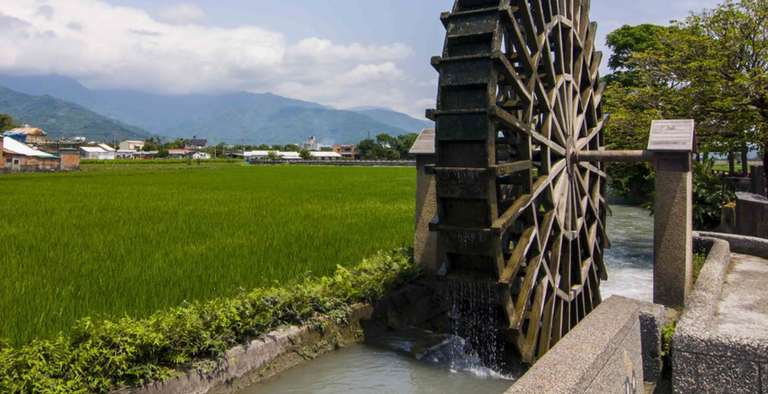
UNESCO new report: Water Reuse within a Circular Economy Context
UNESCO has published a report titled “Water Reuse within a Circular Economy Context”. The report covers many areas of water reuse, from basic principles to application and case studies. Water is a focus for UNESCO as one of the Sustainable ...
UNESCO has published a report titled “Water Reuse within a Circular Economy Context”. The report covers many areas of water reuse, from basic principles to application and case studies. Water is a focus for UNESCO as one of the Sustainable Development Goals, as Goal 6 is “Ensure access to water and sanitation for all”. UNESCO worked with the Intergovernmental Hydrological Programme and the International Centre for Water Security and Sustainable Management.
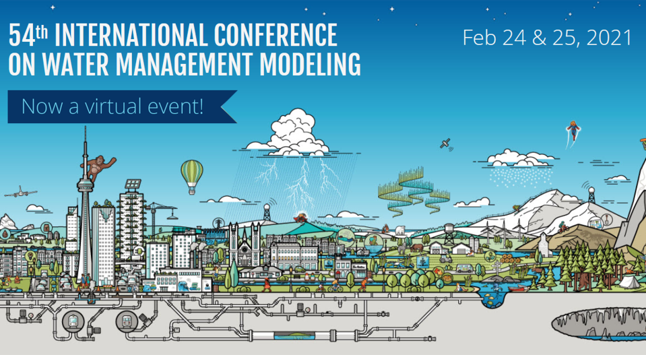
54th International Conference on Water Management Modeling
Abstract submission deadline is February 1, 2021.
The ICWMM brings together professionals from around the world to exchange ideas on current practices and emerging technologies in water management. Emphasis is on state-of-the-art computer modeling for resolving water quantity and quality problems ...
The ICWMM brings together professionals from around the world to exchange ideas on current practices and emerging technologies in water management. Emphasis is on state-of-the-art computer modeling for resolving water quantity and quality problems in stormwater, wastewater, watershed and water distribution systems.
Presentations are of a very high standard and the atmosphere is informal and relaxed. And, by accepting abstracts up until the last minute, a spontaneity is achieved which gives the conference its special character. Click here for conference program.
Effectively the 54th SWMM users group meeting, this is the 1st meeting to be held virtually.
Abstract submission deadline
is February 1, 2021.
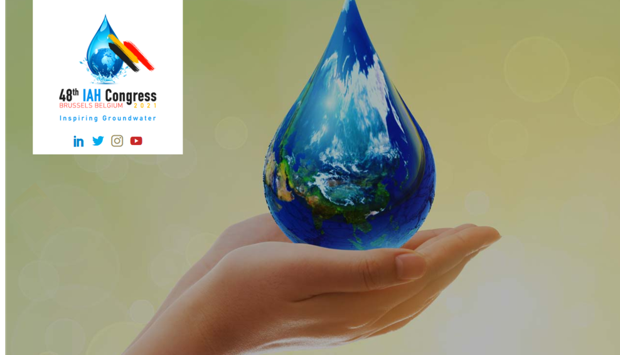
48th IAH CONGRESS
Abstract Submission Deadline 21/03/2021
The year of 2021 is highly anticipated: it is the year after the 2020 Covid pandemic affected our planet. We all hope this world crisis will be behind us in 2021 and we can hold a double congress celebration.
For hydrogeologists, 2021 will see:
...
The year of 2021 is highly anticipated: it is the year after the 2020 Covid pandemic affected our planet. We all hope this world crisis will be behind us in 2021 and we can hold a double congress celebration.
For hydrogeologists, 2021 will see:
- the 47th IAH CONGRESS held in Brazil on August 22nd – 27th
- and the 48th IAH CONGRESS in Belgium on September 6th – 10th.
Two congresses for IAH’s 65th Birthday!
Both committees are working together to bring you coordinated events.
The General theme of the congress is “INSPIRING GROUNDWATER”.
The history of the world shows that water and groundwater have constantly inspired mankind to develop techniques for the production of drinking water, to transport water to people, to the control of water courses, to the search for new sources, to combat scarcity. Access to safe water in sufficient quantities is essential to mankind, to prosperity and economic development. Let the past inspire us to prepare a better future, let our failures inspire us to constantly improve our techniques, let our children inspire us to give our grandchildren a better planet, and let research inspire us to turn the challenges due to climate changes into opportunities and to make groundwater part of the solution towards a society without fossil energy sources.
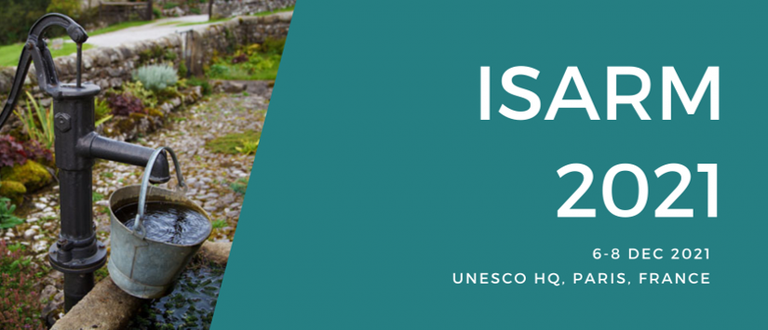
2nd International Conference on Transboundary Aquifers
Abstract submission deadline: 30/12/2020
Conference Thematic Areas
- The contribution of TBA to Sustainable Development in the framework of Global and Regional Agendas, e.g. Agenda 2030 and SDGs (including indicator 6.5.2); Paris Agreement; Sendai Framework; Agenda 2063; etc.
- ...
Conference Thematic Areas
- The contribution of TBA to Sustainable Development in the framework of Global and Regional Agendas, e.g. Agenda 2030 and SDGs (including indicator 6.5.2); Paris Agreement; Sendai Framework; Agenda 2063; etc.
- The Science/Policy interface of TBA: the role of science in the governance and management of TBA
- Advances in the assessment and mapping of TBA and hydrogeological methods
- Management and Governance of TBA: Strengthening Cooperation
- Education, Capacity Development and Raising Awareness
Call for abstracts
Experience shows that a multidisciplinary approach is essential to tackle the management of groundwater transboundary systems.
Physical and social scientists, academics, civil servants, development economists, managers, decision-makers, and governmental officers dealing with issues of transboundary aquifers, are invited to participate and submit abstracts. The abstracts should be in English only (less than 400 words) and it should address a subject on one of the topics of the Conference.
The Scientific Committee will select the abstracts, the selected author will be requested to prepare full length papers. The proceedings will include keynote lectures and accepted papers and will be published online by UNESCO-IHP.
For more detailed information on the Call for abstract: click here.
For any questions and inquiries, please directly contact: isarm2021@unesco.org (link sends e-mail)
Call for Abstracts and First Announcement: English
Important Dates
- Submission deadline for abstracts: 30 Dec 2020
- Abstract acceptance: 30 March 2021
- Second announcement: 30 June 2021
- Final attendance registration 1 September 2021
- Full papers submission: 1 October 2021
- Final program: 28 October 2021
Registration is now available: Register Now!
No registration fees are required to attend or participate in this Conference
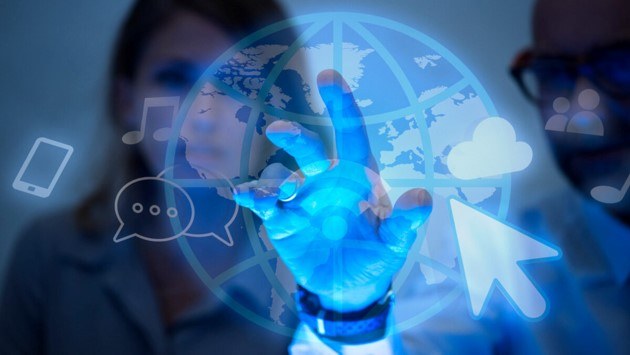
6th IAHR Europe Congress
Global interest in water has increased rapidly in recent years. Many water issues are high on the political agenda, whether it concerns the lack of access to safe water and sanitation or the increase in water‐related disasters due to floods and ...
Global interest in water has increased rapidly in recent years. Many water issues are high on the political agenda, whether it concerns the lack of access to safe water and sanitation or the increase in water‐related disasters due to floods and droughts. Therefore the discipline of hydro-environment engineering and research is more important than ever.
The 6th IAHR Europe Congress will bring together the key players in the sector from around the globe
Plenary lectures will be delivered by eminent scientists. We hope that our Congress will offer a unique opportunity for interesting and fruitful interactions to all participants, providing them with memorable and pleasant experiences.
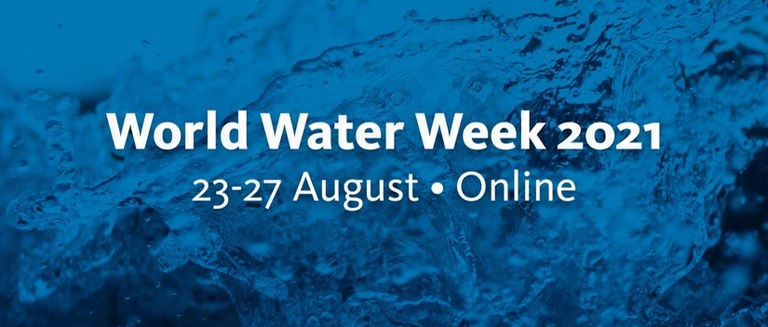
World Water Week 2021
Deadline for paper submission: 24 January 2021
World Water Week 2021 will take place 23-27 August 2021 under the theme Building Resilience Faster. It will be held entirely online, in a new, digital format designed to ensure that people across the world can collaborate to find solutions to the ...
World Water Week 2021 will take place 23-27 August 2021 under the theme Building Resilience Faster. It will be held entirely online, in a new, digital format designed to ensure that people across the world can collaborate to find solutions to the world’s greatest water-related challenges
SIWI is now looking for high-quality academic abstracts to be presented in the nine Scientific seminars that will be developed by World Water Week’s Scientific Programme Committee together with leading international organizations. Learn more here about how you can submit your research abstract and get a chance to present your work to experts within your own field. All papers must relate to a specific seminar – see all the nine topics here.
Deadline: all papers must be submitted by 24 January 2021.
Don’t miss this chance to present your research!
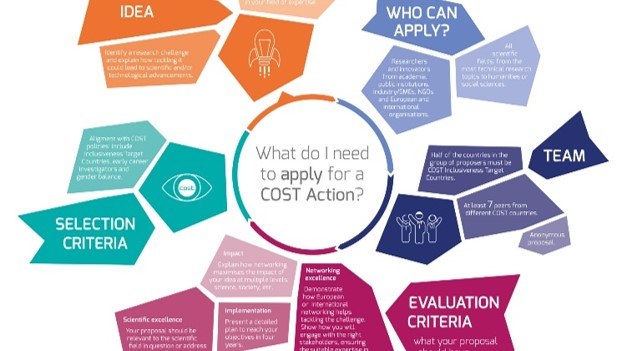
COST Open Call
Deadline: 29 October 2021
COST (European Cooperation in Science and Technology) is a funding organisation for research and innovation networks connecting research initiatives across Europe and beyond and enable researchers and innovators to grow their ideas in any science ...
COST (European Cooperation in Science and Technology) is a funding organisation for research and innovation networks connecting research initiatives across Europe and beyond and enable researchers and innovators to grow their ideas in any science and technology field by sharing them with their peers.
Participants of COST open call are invited to submit COST Action proposals contributing to the scientific, technological, economic, cultural or societal knowledge advancement and development of Europe. Deadline: 29 october 2021.
The Open Call Action proposal submission, evaluation, selection and approval (SESA) procedure is fully science and technology-driven and will ensure a simple, transparent and competitive proposal evaluation and selection process, reflecting the bottom-up, open and inclusive principles of COST.
Participants planning to submit a proposal for a COST Action will need to refer to the SESA guidelines and to the Open Call Announcement on the Documents and Guidelines page.
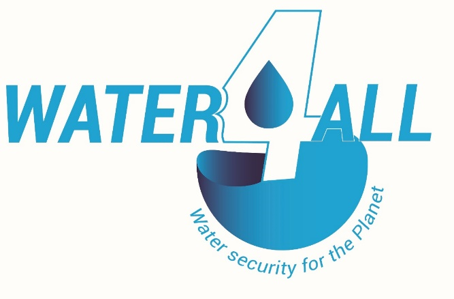
Partnership Water4All - Water Security for the Planet
Stakeholder Consultation for developing the Strategic Research and Innovation Agenda. Consutation until 18 January 2021.
The "𝗪𝗮𝘁𝗲𝗿𝟰𝗔𝗹𝗹 - 𝗪𝗮𝘁𝗲𝗿 𝗦𝗲𝗰𝘂𝗿𝗶𝘁𝘆 𝗳𝗼𝗿 𝘁𝗵𝗲 𝗣𝗹𝗮𝗻𝗲𝘁" Strategic Research and Innovation Agenda draft is now available for 𝗰𝗼𝗻𝘀𝘂𝗹𝘁𝗮𝘁𝗶𝗼𝗻 𝘂𝗻𝘁𝗶𝗹 18 of January 2021 (new date!).
We welcome contributions to further consolidate the agenda, promote its wide ...
The "𝗪𝗮𝘁𝗲𝗿𝟰𝗔𝗹𝗹 - 𝗪𝗮𝘁𝗲𝗿 𝗦𝗲𝗰𝘂𝗿𝗶𝘁𝘆 𝗳𝗼𝗿 𝘁𝗵𝗲 𝗣𝗹𝗮𝗻𝗲𝘁" Strategic Research and Innovation Agenda draft is now available for 𝗰𝗼𝗻𝘀𝘂𝗹𝘁𝗮𝘁𝗶𝗼𝗻 𝘂𝗻𝘁𝗶𝗹 18 of January 2021 (new date!).
We welcome contributions to further consolidate the agenda, promote its wide diffusion and adoption, and capture priorities.
For contributions, please visit: https://bit.ly/374NHMP
"Water4All - Water Security for the Planet" is a candidate Partnership under the European Commission Horizon Europe Research and Innovation Framework Programme with the objective of enabling water security for all on the long term.
The draft agenda that is available has been developed by a Working Group bringing together representatives of the European Commission and main water-related initiatives, networks of experts and associations in Europe (Water JPI, EurAqua, EurEau, Aqua Publica Europea, Water Europe, European Water Association).
𝗧𝗵𝗮𝗻𝗸 𝘆𝗼𝘂 𝗳𝗼𝗿 𝗽𝗮𝗿𝘁𝗶𝗰𝗶𝗽𝗮𝘁𝗶𝗻𝗴!
